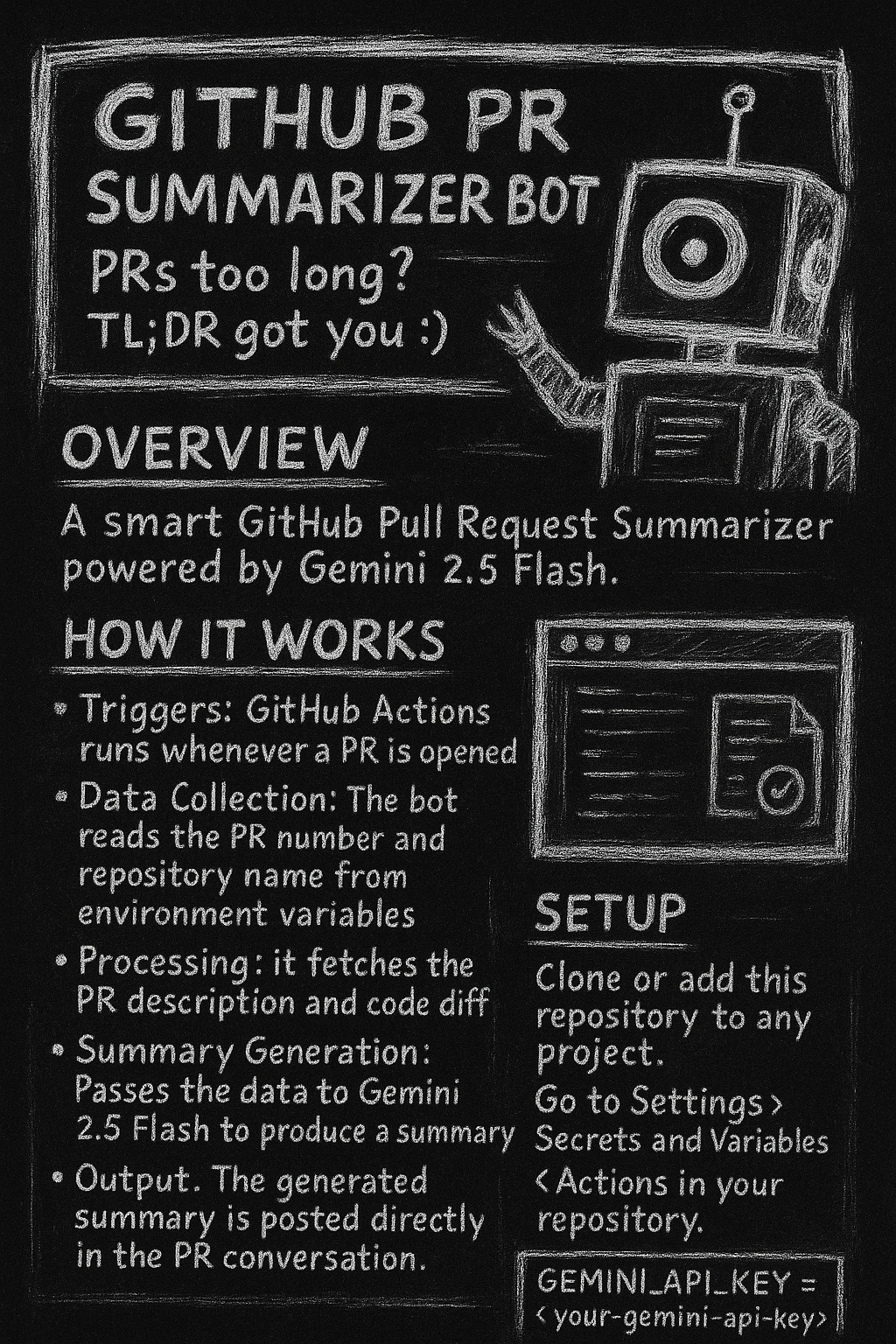Pull Requests Too Long? Meet the GitHub PR Summarizer Bot
GitHub PR Summarizer Bot ➤
So during our freshman year break, me and my friends decided to make a platform where students could exchange 2nd hand products within the campus. And we decided to follow industry relevant practices while making it - like using conventional commits, working on separate branch and raising PRs (MRs for the GitLab folks). Somehow I was the default incharge to read PRs 🥺
But why read in the era of AI (joking, please read your PRs 😼)
So I thought: “What if the PR could just explain itself to me?”
That’s how I got the idea for GitHub PR Summarizer Bot.
Making the Bot ➤
The “plan” (if you can call it that) was simple:
- Whenever a PR opens, trigger a GitHub Action.
- Grab the PR number, repo name, and diff.
- Hand it off to an AI model.
- Get back a short, clean summary.
- Post that into the PR as a comment.
The Trigger ➤
name: PR Summarizer
on:
pull_request:
types: [opened, synchronize, reopened]
permissions:
pull-requests: write
contents: read
The workflow triggers on three PR events →
- Opened: When a new PR is created
- Synchronize: When new commits are pushed to an existing PR
- Reopened: When a closed PR is reopened
We request specific permissions to read repository contents and write comments to pull requests
Job Definition ➤
jobs:
summarize:
runs-on: ubuntu-latest
steps:
- name: Checkout code
uses: actions/checkout@v3
- name: Set up Python
uses: actions/setup-python@v4
with:
python-version: 3.11
- name: Install dependencies
run: |
python -m pip install --upgrade pip
pip install -r requirements.txt
Set up an Ubuntu environment (I use arch btw), installs Python 3.11, and install dependencies.
Core Engine ➤
- name: Summarize PR using Gemini
env:
GEMINI_API_KEY: ${{ secrets.GEMINI_API_KEY }}
GITHUB_TOKEN: ${{ secrets.GITHUB_TOKEN }}
PR_NUMBER: ${{ github.event.pull_request.number }}
GITHUB_REPOSITORY: ${{ github.repository }}
run: |
python ./src/main.py > summary.txt
SUMMARY=$(cat summary.txt)
echo "$SUMMARY"
Environment Variables Explained →
- GEMINI_API_KEY → Secret API key for Google’s Gemini AI model. [Get yours here]
- GITHUB_TOKEN → Automatically provided by GitHub for API access.
- PR_NUMBER → The current pull request number from the GitHub context.
- GITHUB_REPOSITORY → The repository name in
owner/repoformat.
Note: Never commit environment variables to your repo. Always keep them in a .env (or .env.*) file.

The Brain ➤
The main orchestrator handles GitHub API interactions and coordinates everything:
import os
import requests
from summarizer import generate_summary
GITHUB_API = "https://api.github.com"
REPO = os.getenv("GITHUB_REPOSITORY")
PR_NUMBER = os.getenv("PR_NUMBER")
TOKEN = os.getenv("GITHUB_TOKEN")
headers = {
"Authorization": f"Bearer {TOKEN}",
"Accept": "application/vnd.github+json"
}
Setup ➤
- Fetch environment variables set by the GitHub Action
- Set up headers for GitHub API authentication using Bearer token
- Use the v3 GitHub API with JSON responses
Fetching PR Data ➤
def get_pr_data():
pr_url = f"{GITHUB_API}/repos/{REPO}/pulls/{PR_NUMBER}"
files_url = f"{pr_url}/files"
pr_resp = requests.get(pr_url, headers=headers)
files_resp = requests.get(files_url, headers=headers)
pr_body = pr_resp.json().get("body", "")
file_changes = files_resp.json()
diff = "\n".join([
f"{file['filename']}\n{file.get('patch', '')}"
for file in file_changes
if 'patch' in file
])
return pr_body, diff
Now things start getting real →
- Two API calls: One for PR metadata, another for file changes
- Extract PR description: The
bodyfield contains the PR description - Build diff string: Combine filename and patch for each changed file (lmao so messy code 😭)
- Filter patches: Only include files that have actual code changes (some files might be binary)
Posting the Comment ➤
def post_comment(comment):
url = f"{GITHUB_API}/repos/{REPO}/issues/{PR_NUMBER}/comments"
requests.post(url, headers=headers, json={"body": comment})
GitHub treats PR comments as issue comments in the API, which is why we use the
/issues/{PR_NUMBER}/commentsendpoint.
Main Flow ➤
if __name__ == "__main__":
if not os.getenv("GEMINI_API_KEY"):
print("[DEBUG] GEMINI_API_KEY is not set.")
pr_body, diff = get_pr_data()
summary = generate_summary(pr_body, diff)
post_comment(f"**PR Summary**\n\n{summary}")
To fetch the data, generate summary, post comment.
LLM Logic ➤
import google.generativeai as genai
import os
genai.configure(api_key=os.getenv("GEMINI_API_KEY"))
Configure the Gemini client with our API key from the environment.
Summarization Function ➤
def generate_summary(pr_body, diff):
prompt = f"""
You are a GitHub bot. Summarize the following pull request based on its description and code diff:
### PR Description:
{pr_body}
### Code Diff:
{diff[:8000]} # truncate to avoid token limit
Respond concisely in bullet points.
"""
model = genai.GenerativeModel("gemini-2.5-flash")
response = model.generate_content(prompt)
return response.text.strip()
Key decisions here ➤
- Model choice:
gemini-2.5-flashis fast and has massive context window(that said, it's free :) - Token limiting: Truncate diff to 8000 characters to stay within API limits
Repo’s here if you wanna peek : github-pr-bot

Looking Back ➤
What started as laziness turned into one of the most useful things I have built.
Of course, in a plot twist, I later got GitHub Student Pro, which meant Copilot could just summarize PRs straight-up (and honestly, it’s way better 😭). But hey - building my own bot first made me actually understand how these things work.